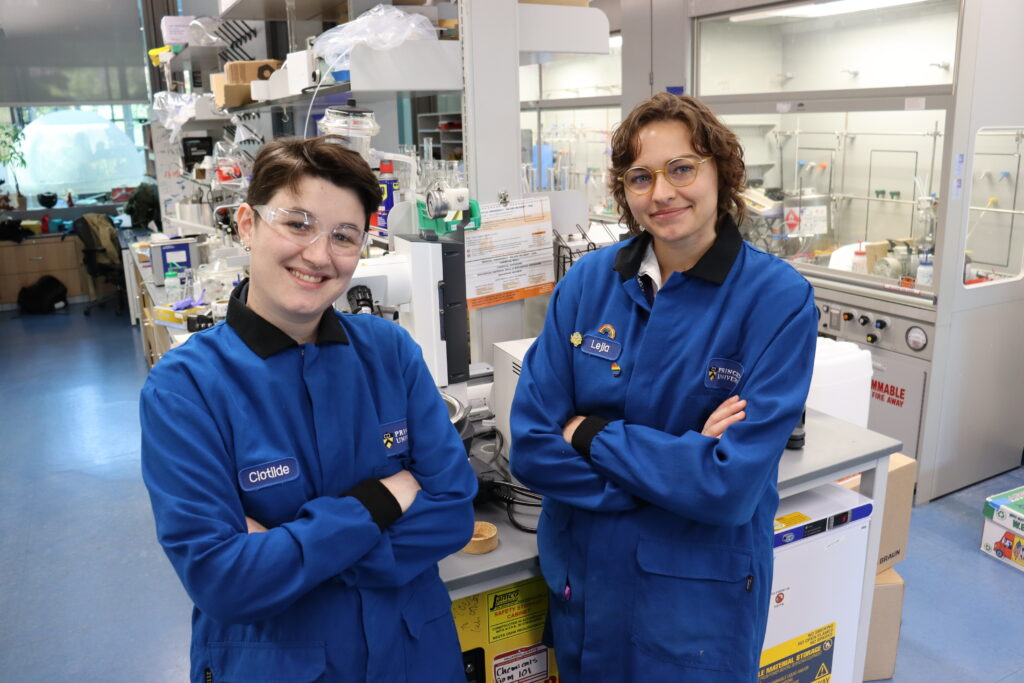A podcast on polymers? With the Stache Lab behind it, you bet

Is “good banter” possible when you’re talking about chemistry, let alone polymer chemistry? Lejla Camdzic and Clotilde Tagnon think so, and have initiated an entire podcast on the provenance, recyclability, and chemistry of plastic through the Erin Stache Lab.
Called “Polymers Unchained,” the podcast will demystify all matters plastic with background, expert discussions, guests, and general information for the average listener from high school on up. Judging from the first episode, the material is delivered in a light-hearted, accessible style by the hosts, who clearly know and revel in their subject. Camdzic is a fifth-year grad student in the Lab and Tagnon, the program’s producer, just earned their master’s degree in chemistry.
And yes, the banter is good.
Enjoy this short Q&A with Camdzic and Tagnon on the new project. The inaugural episode, which first aired last week, can be accessed here: https://bit.ly/3Am2GDe
Why a podcast on plastics?
TAGNON: We have good banter. And anyway, Lejla is among the most qualified at Princeton Chemistry to talk about this. We want to demystify polymers and we knew we could do it in a way that was legitimately understandable to anyone, without any polymer or organic chemistry background. We understand that the field of polymer chemistry seems unreachable, but you can get all the information you need right here.
Is the general public intimidated by chemistry?
CAMDZIC: Yes. Yes. Yes! That’s why I love this format, because you get to take charge of the narrative. I talk to people about polymers and the science that I do, and they immediately say, “I can’t understand that.” And I say, just listen to me for five seconds, I’m going to put it in simple terms and you’re going to understand. By doing a podcast, you get to have a casual conversation in a way that makes the subject really accessible.
TAGNON: Anyway, it’s the opposite for us. We love chemistry so much that we’re doing this in order to let people know that it’s not this terrifying field at all. We can put it in terms that you will be able to conceptualize and that will inform the decisions you make in the world around you.

The new podcast's graphic.
What don’t people know about plastic that bears repeating?
TAGNON: It’s everywhere. The clothes you’re wearing right now are probably anywhere from 50% to 70% plastic. Anything that’s polyester, anything that’s nylon, anything that’s spandex. Anything that has “poly”-something in it, plastic! Like, 98% of sneakers. Airplanes and cars and shelving and home siding.
All of modern healthcare is based on plastics. Everything that makes something sterile is a plastic. Operating room scrubs, all the tubing you use to administer a drug or blood to a patient, syringes, hospital gowns.
Also, the entire body of modern planes are carbon fiber. They used to be aluminum, now they’re carbon fiber because carbon fiber is stronger and lighter than aluminum. But that is a conjugated polymer. It’s plastic. Planes are plastic.
CAMDZIC: Every kind of packaging. Coatings. Wind turbines. With laptops and phones and televisions – it’s in everything and it’s on top of everything. It is important to educate people about the depth of plastic in our lives and the creativity needed to think of solutions for recycling.
What will you be discussing?
TAGNON: What are polymers? How are atoms arranging themselves? What are the resin identification codes? The history of plastics – the plastic industry has really only been expanding since 1950, because that’s when it started being mass-produced. How much plastic is getting recycled or incinerated? How does recycling work in other parts of the world? Polymer characteristics and polymer morphology. We’ll talk about upcycling, which is, recycling into another valued material. And of course, chemical recycling to monomer, because this is what the Stache Lab does.
The problems with plastics seem insurmountable. Will there be some good news in this podcast?
TAGNON: We try to stress this as much as possible: here are the issues and there are literally thousands of people working on them right now. We’re informing you but you don’t have to panic because all of the scientists who are working on it are well aware of what they need to fix and the problems they need to overcome. So we emphasize that this is what we need to fix and then we lead into some of the solutions.
Where can we listen?
CAMDZIC: It’s going to be released on Spotify, Apple Podcasts, and also hosted on the hosting site that we have, Buzzsprout Podcast Hosting, every six to nine weeks.
